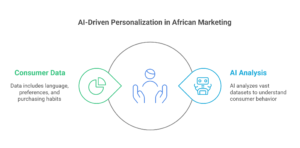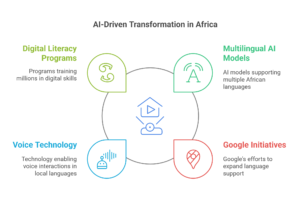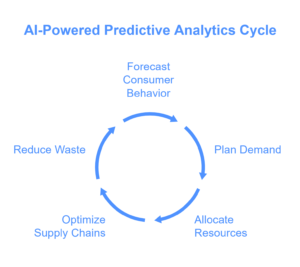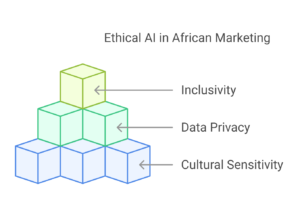Artificial Intelligence (AI) is no longer a futuristic concept; it is shaping industries worldwide, and marketing is no exception. Globally, AI is driving personalization, efficiency, and scalability in marketing strategies. In Africa, where markets are highly diverse and consumer behaviour is rapidly evolving, AI presents an unparalleled opportunity to overcome challenges and unlock new possibilities. The Artificial Intelligence market size in Africa is projected to reach US$4.92 billion by 2025, this statement shows the rapid adoption of AI technologies across the continent. As we look to 2025 and beyond, AI’s role in revolutionizing African marketing cannot be overstated. From enabling hyper-localized strategies to leveraging predictive analytics, AI is set to redefine how African businesses connect with their customers.
The Current State of African Marketing
African marketers face unique challenges: fragmented markets, cultural diversity, limited infrastructure, and the lack of sufficient data for decision-making. Despite these hurdles, technology has paved the way for significant progress in recent years. Mobile penetration across the continent has driven digital marketing, enabling businesses to reach wider audiences. Social media platforms, e-commerce, and mobile money services have become essential tools. However, traditional marketing methods still dominate in many regions, leaving untapped opportunities for data-driven strategies.
AI offers a solution to bridge this gap, bringing innovation to African marketing strategies by addressing issues like fragmentation and infrastructure limitations while capitalizing on the continent’s growing digital ecosystem.
Key AI Trends Shaping African Marketing in 2025
AI adoption in Africa is set to grow, driven by several key trends:
Personalization at Scale
African consumers demand unique and culturally relevant experiences. AI can analyze vast datasets to deliver hyper-personalized marketing messages, tailoring content based on language, preferences, and purchasing habits. This level of personalization will redefine customer relationships, fostering loyalty and boosting conversions.

Voice and Conversational AI
With over 2,000 languages spoken across Africa, voice technology in local languages is set to be a transformative tool for businesses and communities. AI-powered chatbots and voice assistants can provide customer support, conduct transactions, and engage audiences more inclusively, especially in rural and underserved areas where literacy might be a barrier.
Google’s recent advances in multilingual voice technology exemplify this shift. The company has expanded its Voice Search, Gboard talk-to-type, and Translate functionalities to support 15 more African languages, including Yoruba, Igbo, Hausa, and Nigerian Pidgin. These updates now enable approximately 300 million more Africans to interact with the web using their voice. This leap in accessibility is powered by multilingual AI models, which mimic how a child learns a language by associating speech sounds with written characters.
For businesses, the integration of such technology offers immense potential. Retailers can now use voice assistants to offer product information in customers’ preferred languages. Banks and financial institutions can employ voice chatbots to facilitate transactions in local dialects, removing language barriers and boosting financial inclusion.
Beyond commercial applications, voice AI is driving digital literacy and education. Programs like Google’s Grow with Google have trained over 6.5 million Africans in 2023, equipping them with digital skills that include the use of AI tools. Additionally, a $5.8 million commitment by Google towards AI skilling and education in Sub-Saharan Africa is set to further empower students and workers, creating a foundation for AI-driven innovation across the continent.
This progress underscores how voice technology, backed by AI, can redefine the digital landscape in Africa—bridging linguistic and accessibility gaps while driving deeper consumer engagement and participation in the digital economy.

Learn Predictive Analytics
AI-powered predictive analytics will help businesses forecast consumer behavior, allowing for better demand planning and resource allocation. For instance, retailers can predict which products will sell more in specific regions or seasons, optimizing supply chains and reducing waste.

AI-Powered Marketing
AI’s potential is already being realized in several industries across Africa:
Retail:
AI-driven technologies are reshaping the retail landscape in Africa, enabling businesses to enhance customer experiences and boost sales. For instance, e-commerce platforms like Jumia and Konga are leveraging AI-powered recommendation engines to suggest relevant products to customers based on their browsing and purchase history. This personalization not only drives sales but also improves user satisfaction by offering tailored shopping experiences.
Konga is taking AI integration a step further with the launch of KongaFM, Africa’s first AI-powered Hit Music and Commerce Station, set to debut in January 2025. This innovative platform will blend technology, entertainment, and commerce, offering brands, distributors, and manufacturers a dynamic avenue for product visibility and market penetration. KongaFM will empower businesses to reach untapped markets in real time while delivering non-stop hit music, creating a seamless fusion of entertainment and commercial opportunities. This initiative promises to revolutionize how commerce is conducted and experienced, showcasing AI’s potential to drive innovation in retail and beyond.
Agriculture:
AI is revolutionizing agriculture in Africa by enabling agribusinesses to connect with target markets through predictive analytics that assess crop yields and market trends, ensuring timely delivery and fair pricing. With over 60% of sub-Saharan Africans engaged as smallholder farmers and nearly a quarter of Africa’s GDP derived from agriculture, the sector holds immense potential for AI-driven transformation.
The effects of climate change, which disproportionately impact African farmers, further emphasize the need for advanced AI tools. For instance, 50% of droughts caused by anthropogenic climate change between 2001 and 2011 occurred in Africa, highlighting the urgency for resilience-focused solutions. AI-powered systems can improve drought predictions, monitor soil conditions, and optimize irrigation, enabling farmers to adapt to unpredictable weather patterns.
Practical applications of AI are already making an impact. In Kenya, farmers are using near-infrared cameras on drones to detect pests and diseases early, enhancing crop health and productivity. Similarly, the Nuru AI tool, usable on Android devices with or without internet, helps diagnose diseases in cassava and maize. This innovation has already benefited 28,000 cassava farmers, demonstrating the scalability of AI in improving agricultural outcomes.
By bridging gaps in agricultural efficiency and resilience, AI is not only boosting productivity but also securing livelihoods and driving sustainable growth in African farming communities.
Media:
AI is revolutionizing content creation and distribution in Africa, enabling businesses to craft more targeted and cost-effective advertising campaigns. By using AI-generated images, models, and voices, companies across the continent are lowering their advertising budgets while enhancing engagement with their audiences. This shift comes at a critical time as ad spending in sub-Saharan Africa dropped by 11.6% in 2023, according to the World Advertising Research Centre (WARC). However, a rebound is anticipated, with South Africa driving growth through a 6.1% increase in ad spending.
Leading the way in AI-driven media innovation is Safaricom, East Africa’s largest telecommunications company, which launched Africa’s first AI-generated TV ad in August 2023. Since then, Safaricom has expanded its use of AI in advertising campaigns across multiple platforms. Other Kenyan companies, such as Pioneer Private Schools, Kartasi Group, and Supa Loaf, have also embraced AI to create TV ads, design product covers, and develop billboard imagery, respectively.
In Nigeria, Coca-Cola collaborated with local influencers in an AI-powered Christmas campaign, demonstrating how AI can enhance cultural relevance and resonate with specific audiences. Beyond ad creation, AI-powered platforms are also recommending locally relevant content to African viewers, personalizing their experiences based on viewing habits. This combination of AI creativity and personalization is reshaping the media landscape, enabling African brands to connect with audiences in innovative and impactful ways.
Overcoming Barriers to AI Adoption
Despite its potential, AI adoption in Africa is not without challenges:
- Digital Infrastructure: Many regions still lack reliable internet and electricity, limiting access to AI-powered tools. Governments and private organizations must prioritize infrastructure investments.
- Talent Shortages: Skilled AI professionals are scarce in Africa. Addressing this requires investment in education and training programs to equip the workforce with AI competencies.
- Data Privacy Concerns: Trust is essential in leveraging AI. Businesses must adhere to ethical standards and data privacy regulations to gain consumer confidence.
Collaborative efforts between governments, tech companies, and educational institutions can help overcome these barriers and accelerate AI adoption across the continent.
AI and Ethical Considerations in African Marketing
As businesses embrace AI, ethical considerations must remain a priority:
- Cultural Sensitivity: AI algorithms should reflect the diverse cultural contexts of African societies to avoid bias and misrepresentation.
- Data Privacy: Companies must be transparent about how consumer data is collected, stored, and used. With laws like the Nigeria Data Protection Regulation (NDPR) and Kenya’s Data Protection Act, businesses must prioritize compliance.
- Inclusivity: Ensuring that AI technologies are accessible to all demographics, including underserved and rural populations, is crucial for equitable growth.

Future Possibilities
Looking beyond 2025, the transformative potential of AI in African marketing is immense. AI will not only help businesses scale but also democratize access to global markets. Small and medium enterprises (SMEs) can leverage AI to compete with larger corporations by targeting niche markets with precision. Additionally, AI can empower local entrepreneurs to create solutions tailored to African contexts, fostering innovation across industries.
Research by PwC reveals that 45% of total economic gains by 2030 will come from product enhancements driven by AI. This will stimulate consumer demand through greater product variety, personalization, affordability, and overall attractiveness. Such advancements will enable African businesses to deliver tailored experiences that resonate deeply with diverse consumer bases.
AI could enable entirely automated and seamless marketing ecosystems, where businesses and consumers interact effortlessly through intelligent platforms. It could also drive the integration of augmented and virtual reality into marketing campaigns, creating immersive and culturally relevant experiences for African consumers. These possibilities highlight a future where AI not only redefines marketing strategies but also strengthens the continent’s economic and creative potential.
Conclusion
AI is poised to revolutionize African marketing, enabling businesses to overcome challenges, enhance customer experiences, and achieve growth at an unprecedented scale. However, the journey requires a collective effort to address infrastructure gaps, ethical concerns, and skill shortages. As we enter 2025, African businesses have a unique opportunity to embrace AI and position themselves as leaders in the global digital economy. The time to act is now—AI is not just the future of marketing; it is the key to unlocking Africa’s untapped potential.




